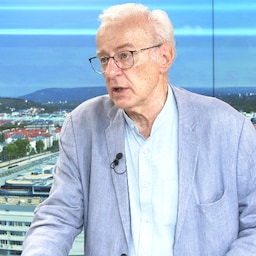Treasures through melting
How Russia and NATO are competing for the Arctic
There can no longer be any talk of "eternal" ice in the Arctic, as the ice in the Arctic Ocean is melting inexorably. Climate change is making the region more accessible for shipping and unearthing rare natural resources. This awakens covetousness ...
In the "race" for the Arctic, political observers see Russia in the lead, but the USA is pushing for more influence under Donald Trump. The Republican's threats to use military force to incorporate Greenland into the United States as the 51st state if necessary are no different. The world's largest island has many of the raw materials that are essential for a successful energy transition. There are barely exploited reserves of uranium, gold and rare earths beneath Greenland's thick layers of ice. According to the German Mineral Resources Agency (DERA), the deposits of rare earths alone would cover the world's needs for 150 years.
However, Greenland is not only interesting for the United States because of its mineral resources. With its incorporation, the United States would also have much greater access to the Arctic Ocean, which is currently limited to the sea zones off Alaska. In the US government's Arctic strategy, the area is described as a "strategically important region". Political observers agree that Trump's rhetoric towards Canada can be interpreted in the same way. Trump is probably aiming to move the US border further east in order to contain Russia and China and control the Europeans, explains political scientist Heinz Gärtner.
Russia had bilateral agreements with many countries. Now we are witnessing an arms race in the Arctic.

Politologe Heinz Gärtner
Bild: krone.tv
Russia and China want to control trade routes
Russia is the biggest geopolitical player in the Arctic. Vladimir Putin laid claim to a further 1.2 million square kilometers in the region in 2023. Around half of the Arctic territory already belongs to Russia. Moscow has expanded its military presence in the Arctic in recent years in view of the war in Ukraine and the accession of Sweden and Finland to NATO. Old Soviet bases and airfields have been reactivated. The Kremlin has also invested in huge industrial projects, such as floating nuclear power plants or gas processing plants anchored in the permafrost. Russia also has the largest icebreaker fleet in the world. This includes gigantic nuclear-powered ships: a means of controlling shipping traffic in the Arctic Ocean.
Russia is supported by China in the expansion of its supremacy. The US government describes the country as an "important donor for Russian energy exploitation in the Arctic". Both countries are also cooperating militarily in the region, as joint exercises off the coast of Alaska have shown. China has invested a lot of money in polar exploration in recent years. However, Russian-Chinese cooperation is not without conflict, explained Gärtner. For example, with regard to a "polar Silk Road". For both nuclear powers, however, the control of trade routes, such as the Northwest Passage, is the main focus.
Expert: "Experiencing an arms race in the Arctic"
In contrast, the remaining Arctic states of Canada, Norway, Iceland and Greenland (Denmark), which - like the USA - are all members of NATO. The maritime borders between the respective zones are not clear in many cases, and some areas are still disputed. Tensions have increased at the latest since Russia withdrew from the Arctic Council after the start of the "special military operation". "Until 2022, it was not a confrontation. Russia had bilateral agreements with many countries. Now we are experiencing an arms race in the Arctic," explained Gärtner. The Arctic has become a "Russian priority".
Above all, control of the Arctic is desirable from an economic perspective. Once the ice in the Arctic Ocean has largely melted, sea routes that were previously difficult to access, such as the Northwest Passage, will be navigable for large parts of the year. This could massively shorten existing sea routes via bottlenecks such as the Panama or Suez Canal and make them less important. Controlling the passages is a lucrative business for both Russia and China, as well as for the USA.
This article has been automatically translated,
read the original article here.



Kommentare
Willkommen in unserer Community! Eingehende Beiträge werden geprüft und anschließend veröffentlicht. Bitte achten Sie auf Einhaltung unserer Netiquette und AGB. Für ausführliche Diskussionen steht Ihnen ebenso das krone.at-Forum zur Verfügung. Hier können Sie das Community-Team via unserer Melde- und Abhilfestelle kontaktieren.
User-Beiträge geben nicht notwendigerweise die Meinung des Betreibers/der Redaktion bzw. von Krone Multimedia (KMM) wieder. In diesem Sinne distanziert sich die Redaktion/der Betreiber von den Inhalten in diesem Diskussionsforum. KMM behält sich insbesondere vor, gegen geltendes Recht verstoßende, den guten Sitten oder der Netiquette widersprechende bzw. dem Ansehen von KMM zuwiderlaufende Beiträge zu löschen, diesbezüglichen Schadenersatz gegenüber dem betreffenden User geltend zu machen, die Nutzer-Daten zu Zwecken der Rechtsverfolgung zu verwenden und strafrechtlich relevante Beiträge zur Anzeige zu bringen (siehe auch AGB). Hier können Sie das Community-Team via unserer Melde- und Abhilfestelle kontaktieren.







